I think if you ask me about my general impression of Deep Space 9, it’s going to come across as extremely negative. That’s pretty reasonable, I think because if you bring something up to me about the series, on pure statistics, it’s probably going to be one of the long, large threads that runs throughout the story that really fucking irritates me.
There’s some stuff where there’s this self contained bubble, where there’s nothing interesting to be said about criticising them because the show itself wants to just drop them and pretend they didn’t happen. That stuff isn’t particularly irritating, and I don’t want to harp on things like Verad Dax as a signal of something bad about the series. Some stuff in this episodic show is going to be episodic, and the joy of this kind of storytelling is that they can try a lot of things and then ditch them if they can’t come up with a good reason to keep using it. Hey, remember how the Vorta had psychic powers in their first appearance? Could be super useful to have telepathic, betazoid-style diplomats, couldn’t it?
There’s also the way that when it comes to any given Star Trek property, the first season is essentially a wrapper that you have to be willing to throw away. While I liked Picard and Discovery from day one, both of those series were made in a modern era, and not in the heydey of TV syndication. Otherwise I’d have to spend a few hours bollocking stuff like the Wadi or fucking Rumpelstiltskin.
But anyway.
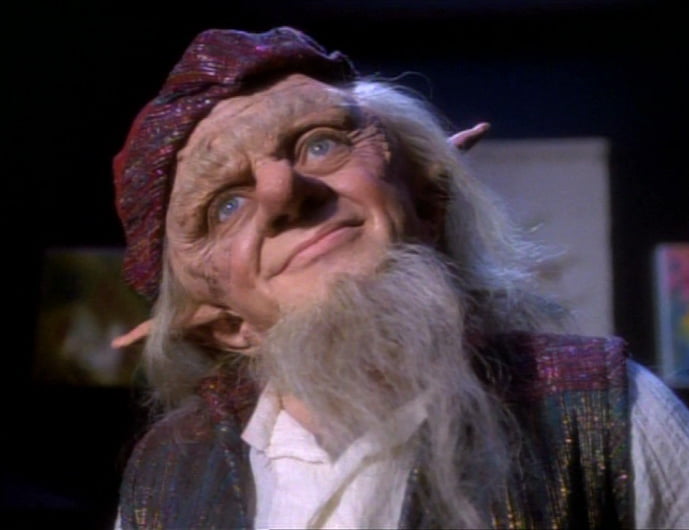
That’s all very forgiveable. I don’t think it’s interesting to criticise episodes that were weak because they were mostly being made to extend budget. While I don’t like them, episodes like the Mirror Universe ones which reuse sets and characters and just say ‘like that, but they’re evil now,’ serve a purpose of getting an episode out there, and letting the actors have some fun doing something different. I even filed these things on my spreadsheets as Something Magic Made Everyone An Asshole For Exactly One (1) Episode, because they really don’t have any impact on the greater plot. Definitionally, the value of episodes like that is they let you do some wild stuff, then press a button at the end of the episode and say none of that matters or happened.
That’s not to say a story having no greater impact is actually bad! Some of the episodes of the show that I really liked are self-contained little science fiction narratives that come from nowhere and go nowhere, and some episodes that other people really like are basically the same thing. The Visitor, a season 4 episode, is generally held up as an example of excellent science fiction storytelling, and it is a pretty good little science fiction short story told in the context of Star Trek. I also don’t care for it too much, though, because in a story that’s otherwise doing ongoing development and character arcs, it stands out as an hour of the series that writes itself out of existence, and tells us largely nothing that we don’t already know.
Well, okay, that’s not wholly true: It tells us that Nog has the potential to be a captain and it tells us Jake and Sisko love each other very much. Which is a theme we see repeated in a lot of other places, including how understanding Sisko is that his fifteen year old son is dating an adult woman who works in a bar owned by Quark, who we need to remember, is scum. Which is where another complaint comes up: This series is extremely fucked up as it relates to Jake specifically relating to women. That extends to how he’s told to regard Nog’s vile sexism as being an acceptable cultural difference.
This means that Jake shows up in only a small number of capacities, and he’s usually a b-plot in an episode that’s about something else, and that creates some grotesque tonal mismatch. Here are two of our heroes dying on a mountain, and in contrast, here’s Jake and Nog trying to trade for a new boot.
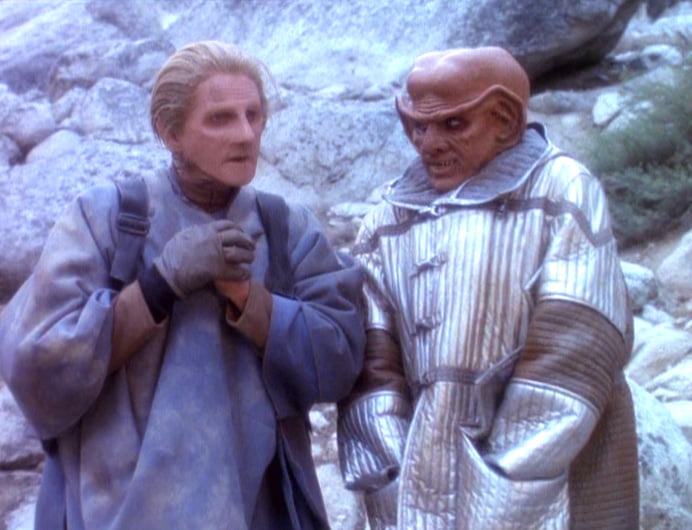
Look, I know people like Nog a lot. There’s a lot of sympathy online about it, especially since Aron Eisenberg passed away, and I am not trying to make anyone dislike him in any way. In the most basic form, his character is an outsider who wants to be more than the lot in his life has set out for him and therefore strikes out to achieve it. That’s cool, I can see why people like Nog.
I don’t.
Mostly, it’s because he’s a Ferengi, and the entire point of the Ferengi in this story space is to say ‘well, socialism is dumb, right?’ You have to choose to ignore all the times Nog is an awful creep, and a wheedling sycophant, and the times that the authors use him to ‘make a point’ about the Star Trek setting. The ways he just immediately whips back to being a greedy little asshole when he’s out of the Federation’s auspice. If you can set all those things aside, I can see why people like him.
It’s really hard for me to set those things aside.
There’s this phrase in Games of Empire where capitalism creates its own metaphysics – the idea that in a capitalist society, capitalism seems to those people who live in it as fundamentally natural and obvious. It’s made most egregious when Nog asks Jake about how life in Starfleet works, if everyone doesn’t need anything, and Jake is stumped by this. He can’t present his life as meaningful in the society he grew up in, and that right there is a failing not of Jake, but of the people writing Jake being unable to conceive of what it’s like to grow up in a society that has transcended capitalism. Jake reacts as if all it takes to point out the stupidity of a global, society-wide social support system is a literal child going but why.
Nog is also one of the only recurrent cast members who actually hurt, which is really good and the episode that deals with him retreating from his pain is pretty good, but it’s also an episode in the holosuites and another in a line of episodes that focuses on Vic, a character that…
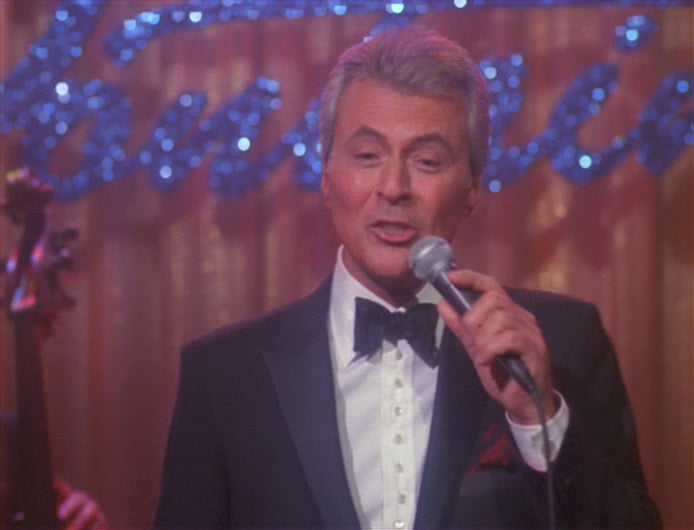
Christ.
Vic is an AI lounge singer. He doesn’t exist. He is a fake bit of code created as part of a videogame someone plays. There are multiple episodes about how meaningful his insight is, how he escalates a long-boiling relationship (THAT HE ABSOLUTELY SHOULD NOT HAVE) and there’s also an episode about all the characters running a real heist in his fake casino to protect him from even more fake mobsters. This is stupid. We’ll set aside the Holosuite for a moment, though, because Vic is inherently offputting to me.
Male lounge singers have never, in my life, come across as interesting people who I would listen to for advice in relationships. They always project the aura of someone who’s yearning for a time in our history where sexual harrassment was just a part of the workplace, who has nostalgia for a period where men were men, women were objects, and the mob owned everything. I’m not saying you can’t do something cool with that, but all Vic does with it is present a safe, sanitised version of the character archetype who’s basically a fucking genie.
Then there’s the Holosuite.
The Holosuite is something that should be great. The technology isn’t a problem – we can teleport and replicate things and we have hardlight holograms, whatever, those thins are acceptable. It’s also completely obvious to me that they would be used this way: this tech would have great gains in helping confront feelings of isolation, and would let people play around. That’s fine.
The problem is the amount that Holosuites breaking is used to force a plot to work one way. It’s not quite the levels it gets to in The Next Generation where a holosuite created life and then tried to contain it in a data bank, but the principle of ‘stuck in the holosuite’ remains a big problem. If your game design has a failure state where people get shot in the face you haven’t designed a good system. We limit what you’re allowed to do with bikes and they’re much less dangerous than a machine that lets you create fucking life.
It’s not that you can’t make a good episode out of it! Probably one of the best episodes in the series is about using the Holosuite to play a game! And when contrasted to other series, the Holosuite in Deep Space 9 is largely used sensibly, with it being a component of other people’s stories, and only one or two episodes focusing on trying to make the whole episode take place there.
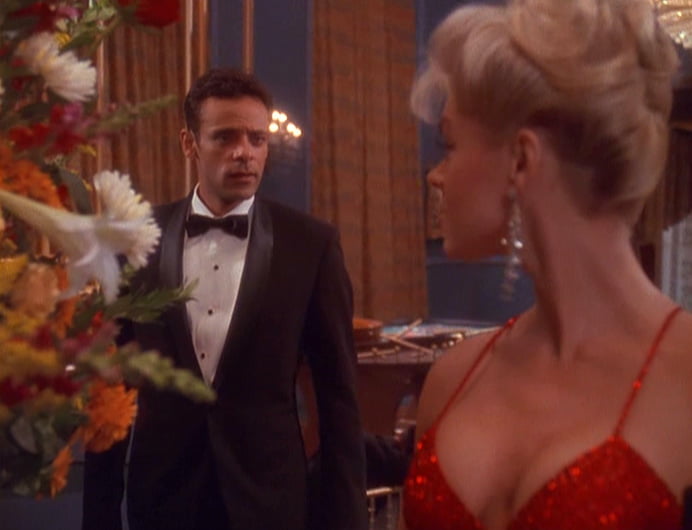
Honestly, it’s kind of frustrating to dismantle, because most of my complaints about the Holosuite are from other series, but the most important Holosuite episode here in DS9 is an episode that makes me angry even though it’s a really good episode. I talk of Our Man Bashir.
In this episode, Bashir is playing around at being a fantasy 007 style spy, and then Garak (a real spy) comes in to hang out and make fun of him. Then all the heroic characters that matter get teleported into the holosuites, but they think they’re the characters, and now, all the characters have to / get to play out their lives in the story. Actors get to do something different for an episode, funny accents and different sets are used, whatever. The episode contrasts Julian Bashir’s vision of what a spy should be, and how his hippocratic oath interacts with how those jobs should work, and Garak’s much more practical actually having had to do this shit perspective on spying. It’s a really good, fun bit of characterisation, where Garak wanders alongside Julian’s fantasy, and points out how much of what Julian does is dumb.
But the story vindicates Julian.
This bugs the shit out of me! The fake spy who creeps on women is the winner, folks, because he didn’t give up and believed in something, when you consider that Garak’s biggest problem is believing in something, augh. Fuck that.
It kind of just continues the arc of Julian Bashir, though. This dude spends… three seasons, I think? Hitting on women in a super creepy way. It’s revealed later that he’s been hiding how perfectly awesome he is, and how it’s such a burden being so genetically perfect, because he could never understand what about him was really ‘him.’ And if his problem was making lots of strangely obvious mistakes or keeping people at arm’s length, that would make sense.
The problem is that Bashir prior to this point isn’t painted as someone with anxiety about his accomplishments, or grappling with some secret about who he really is. He’s presented as a competent, extremely oily and creepy doctor. What’s more, the oily creepiness doesn’t stop after the revelation of his genetic tampering, and yet people bring it up repeatedly as if they’re meant to sympathise with Julian for the struggle he has at being too great.
None of that, however, covers for the fact that the dude treats women really creepily! It’s not a solution to the problem of him being a creep! It’s an unrelated problem, and yes okay, once the writers get their head around that being the core of Julian’s being, that he’s dealing with being too perfect and try to do interesting things with it, there’s a bit more to the dude, but it’s all treated as if it answers a question when it in fact, answers a different, unrelated and extremely unimportant question to the question I kept having about why this dude seems to think that women saying no is negotiable! It’s not like his holosuite time is spent being not horny, it’s not like the sexual proclivities are a front!
Which, well, of course the holosuite would be used primarily for fucking, and
Well.
That brings up the next problem, which is Worf.

Worf sucks.
Worf sucks so fucking badly it is depressing.
I’ve known Worf since I started watching Star Trek: The Next Generation, where I observed – as so many people already did – that this guy just existed to have his ass kicked. The story threw him around to show that whatever they were facing was something they couldn’t punch. TNG – as all Treks before Discovery, really – had terrible fight choreography and didn’t really know how to sell violence, either as a personality trait or as a physical action, which meant that mostly Worf was getting love-tapped in floaty, slow theatric combat scenes, and going down like a sack of spuds. He wasn’t even set up to be ‘the dangerous one’ in the stories that focused on the characters in The Next Generation fighting, because there was always Data, right next to him, who could basically curb stomp Worf through sheer physical strength.
Worf was always going to walk uphill to fix that history. Still, he had a chance! Deep Space Nine was a new place, with a new landscape, a new kind of storytelling and a new space to work. Worf didn’t have to see brand new things every week that showed everyone around Worf they were strong by kicking Worf’s ass. Worf could be his own person and stand on his own feet. How strong was a Cardassian? We could find out when one tried to fight Worf and lost! Was Worf a particularly scary Klingon? We had other Klingons around to test him against, that’d be great! Or maybe we’d just see differences in policing style, where Worf wasn’t operating security on a small town where people could be isolated and imprisoned easily and instead had to deal with being seen as an agent of personal violence on the regular. That could be interesting. Being a head of security means having a relationship with the people who stay and building a relationship quickly with the people who don’t. They had such potential.
Then, instead of all that, we get another cavalcade of faiure.
Worf failed to be a good detective. He failed to be a good brother. He failed to be a good partner. He failed to be a good klingon, and he failed to be a good alien. He even bunked on the Defiant, a ship that was introduced so they could Worf it in the first episode it showed up. But now it wasn’t just that Worf was bad at these things, that the story needed him to fail so he failed. He also failed in these really awful, morally repugnant ways, these ways that made Worf not just into a failure, but also a complete fuckin’ asshole.
Worf, a klingon, from an alien culture, struggles with helping his brother commit assisted suicide. His solution as depicted in the show is instead to mindrape his brother. Commentary has said that they thought about having a scene where his brother was asked for his consent for this, but then they decided not to show it.
When Worf and his girlfriend are having communication problems, he engages in deadly acts of global ecological terrorism, and when he changes side, both he and his girlfriend agree that hey, they were both at fault. He’s then immediately forgiven by the authorities for the act of global fucking violence.
When presented with an abusive mother figure bullying his girlfriend, he gets mad that his girlfriend is making it difficult for him to conform to tradition that’s hurting her and forcing her to ignore components of her personality.
When he, a duty and honour bound alien who makes a big deal about his ability to maintain stupid principles even to the point of his own death, is presented with an interesting moment to make a painful choice for us, to let Jadzia die and complete the mission, he just does the boring fucking thing anyone would do anyway, and then the story points out how stupid it was he was in that position to make that choice anyway! You don’t get to spend that quarter, writers! You put a married couple in a life-or-death mission, you don’t get to then have Sisko bail them up afterwards for being in that position, because it was his fucking job to ensure that they weren’t.
Then, and this is the thing that will always stick with me about Worf and the gagworthy way they try to handle him and Ezri Dax interacting after Jadzia’s death, when Worf is forced to confront the fact that his dead wife – who he loved – had partners other than him, he responds by slut-shaming a dead woman.
This guy fucking sucks, who could like this guy?!
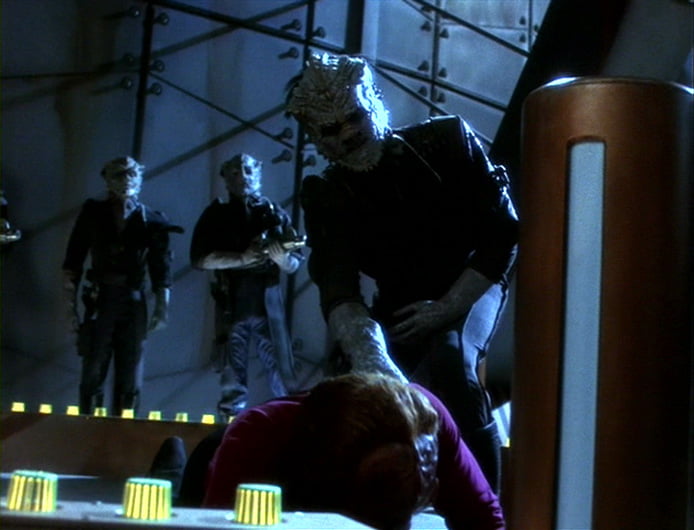
Worf is one of those really important lessons in how this show is about what you ignore. If you can ignore how much he sucks as a person, how much he sucks at his job, how much he sucks as a story component, and instead choose to pay attention to his good moments, you do get a single, brilliant, excellent moment the entire fucking series. You can look at the fight in By Inferno’s Light where he basically gets whaled on by Jem’hadar for hours and refuses to tap out.
The idea presented there is that his spirit refuses to break, and therefore, he can’t be defeated to the satisfaction of the Jem’hadar. This is represented by him getting into a fight with a sequence of Jem’hadar who are stupid and don’t know how to fight; they never aim to break his legs or hands, they never bring to bear bladed weapons or their own horns. It’s just a really strong Jem’hadar whaling on Worf’s midsection, and occasionally slapping him in the head, waiting for him to not press the button that resets the round. He keeps pressing the button, he keeps getting beaten on, and the Jem’hadar doing it declare that they can’t defeat Worf, they can only kill him.
This would be pretty cool writing, done well. It’s a triumphant moment where Worf faces down a superior foe that doesn’t just squish him in one shot, and shows something of who he is.
That’s pretty cool.
You just need to ignore so much to get there.
The Jem’hadar are supposedly fighting the klingons to learn about fighting them, and the Jem’hadar care about defeating this guy’s morale rather than just killing him. The Jem’hadar, a race of super soldiers that don’t have a culture beyond what’s genetically imprinted on them, that are disposable and constructed to be tools of a race that doesn’t care about their health, wellbeing, or welfare. Then, this one presents itself as having a sense of honour, a vision of defeat versus death, and caring about sparing Worf because he wasn’t going to be defeated by merely being beaten up.
Why.
The Vorta’s repsonse is pretty simple – kill them both. Duh. Because this is a prison, and these people aren’t being beaten up to show some moral aspect of their character, they’re being beaten up to teach their soldiers stuff. It’s a task with a purpose. Instead, then, the sequence is written backwards, where they know they wanted to show Worf get whaled on and not suck, they concept correctly the kind of thing that they can use to do that, and then they employ the alien race that has no reason to behave that way. This fantastically practical race of culture-free murder-monsters suddenly develops a moral framework that values and respects Worf’s inability to threaten them and his refusal to stay down anyway.
So he gets one good moment.
And it’s dumb.
I don’t like feeling this way about Worf! By all accounts, Michael Dorn is great! His stoic demeanour appeals to people! He can be a great straight man to the others around him, and furthermore, I’m sitting here sneering at the character of one of the most prominent men of colour in science fiction!
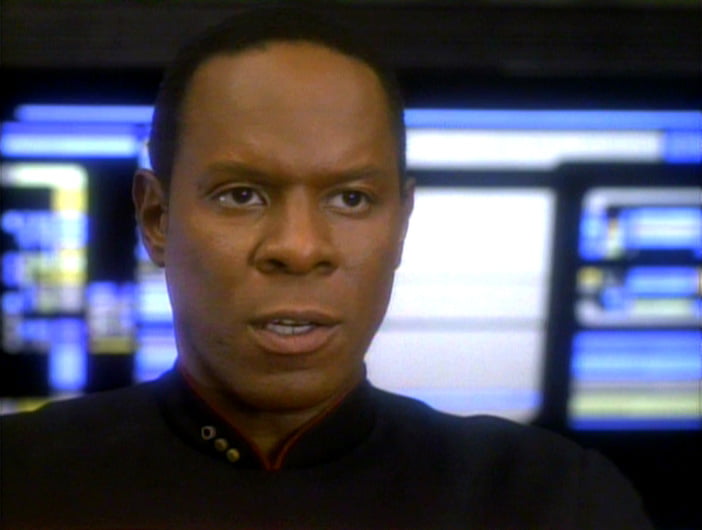
And speaking of that.
Sisko is a beloved captain who presents a positive representation of a black father in a show in this period who is neither absentee nor casually abusive and I understand how important that is. It’s not my experience – either in blackness or the paternal relationship. I understand that he may seem really great. What I do know is what it’s like to have a father who believes in an extreme religious ideology that makes him unresponsive to reasonable requests in your teenage years!
Look, Sisko’s meant to be this wonderful dad figure and people love him but I found that god damn this guy did not age well in narrative. His emotional intelligence is roughly that of a lettuce most of the time, and he enables the previous Jake stuff (like letting him date an adult when he’s a teenager??). He bullies Quark, where I’m a little torn because Quark sucks but also if he does that it kind of indicates that the dude is willing to bully people to get his way in the first place. Then there’s the absolutely wasted potential of his relationship to the Bajoran religion.
See, there’s a way that this story could have happened. There could have been this narrative where Sisko was the first person to travel the wormhole, and the Bajorans might have seen that and pointed out how it matched their religious texts, their prophecies, and declared him a religious figure. Then, Sisko, this outsider to the culture, has to struggle with the significance of being important – and consulted! – by this faith-based culture as he sought to navigate the complicated nature of being outside a religion but included in its ideology. That right there is interesting, especially when you see how people interweave their relationships with their politics and their interpretations of their religion!
But.
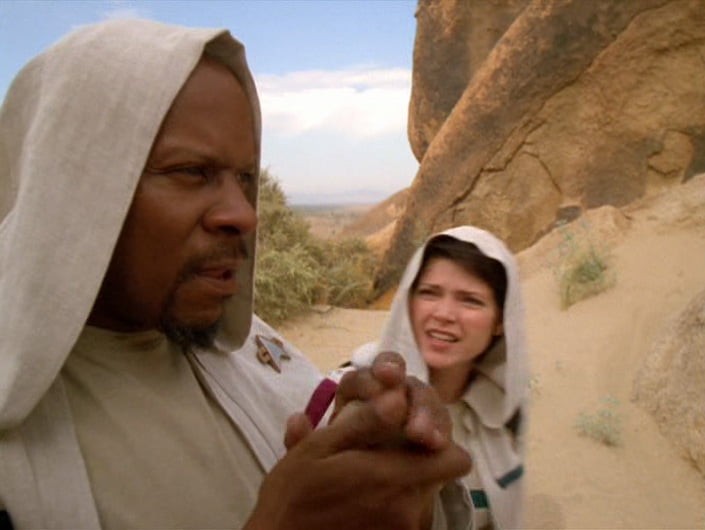
But.
You might notice at no point did I need to invoke actual fucking gods.
Because that’s the shit that lurks in the punchbowl at the start of this series. The entire question of the prophecies and the religious culture of the Bajorans is shown as being factually true and based on real four dimensional space super aliens. He’s shown as being the child of a time-travelling mind rape god, and that’s treated as romantic. At one point, the writers, realising they’ve put themselves in a fucking corner, solve it by literally praying an enemy invading fleet out of existence.
Christ that sucks.
It’s really hard to meaningfully comment on religion when it’s fucking true. Every story about religion as it relates to the complexities of people living their lives informed by religion in a science fiction story is made completely ridiculous when you present but what if the gods were real? That’s not interesting! That, to me, as someone who grew up religious, and who has dedicated a lot of time talking about and thinking about the meaningful relationship of our lives to religion and culture, a fucking cop out.
Faith has to be faith to be faith. If you beleive in the wormhole aliens that are right there, then the whole thing is stupid. It’s like believing in the postman.
And then let’s throw onto the pile, the added way that this whole plot tumor fails to work when the story needs to keep going with it. There’s a legitimately interesting story about the way the politics and religiosity of the various people of Bajor interact – the Kai Wynn narrative and Vedek Baral story is legitimately interesting when it’s about people making political choices informed by their ideology – whether sincere or fake!
And then they don’t matter any more because that story is out of gas and instead the series starts to have to involve the Pah’Wraiths and Gul Dukat looking into fucking cthulhu books in a plot point built along the entire Dominion war and the Cardassian insurrection that ends like a wet fart. The conclusion to the entire Prophets story is a post-script that even pulls a ‘jk, we’re not doing that’ in its own wrap-up. This series spent three hours of my life building to lovecraft versus the time demons and the whole ending feels like a fucking outtake.
Now the argument about this is that hey, it’s because the writers had to work on too much at once, and the two writers managing these two parts weren’t able to get the ending they wanted done. Well la-di-dah, that doesn’t actually fix anything. That’s a reason why the story sucks, but it doesn’t actually stop the story sucking.
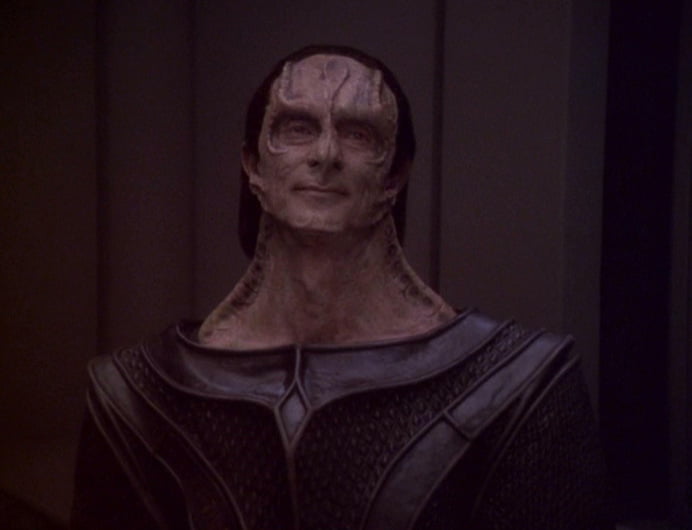
Finally, there’s Gul Dukat. Gul Dukat is a great villain. He’s written excellently. His actor does an amazing job playing him and there’s wonderful, magnetic, charming assholishness to the character. Dialogue wise he’s possibly one of the three best in the show. He is almost fine, really. The thing about Gul Dukat that I hate, that sucks, is the way that the stories he’s in and the characters he’s dealing with seem to forget he’s a fucking space nazi.
How hard do you have to fuck up that your story can feature a space nazi and the characters around him say: well, shit, but is he that bad? Isn’t it bad enough that his daughter died?
No! Fuck that guy! He’s a space nazi who personally raped and murdered people, and oversaw the death of millions in a colonial occupation!
Seriously, Sisko, you dipshit!
Oh, and if you’re wondering, with this extensive anger all finally put on the page like this…
I really like Deep Space Nine.
I really enjoyed this show! I really enjoyed it, and part of why this stuff makes me so bloody angry is because this show has in it positively excellent stories and components, which makes the failures and the fuckaround and the wildly incoherent moral framework of some of these shithead characters so frustrating. If a show had nothing going on, if the characters sucked, I wouldn’t get mad at it for wasted potential or bad stories! This is a series that has great writing and good characters and fun episodes and all that jazz and so when the story fucks up it actually feels like it matters.
God damnit Rick Berman sucks so much.